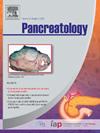International Association of Pancreatology Revised Guidelines on Acute Pancreatitis 2025: Supported and Endorsed by the American Pancreatic Association, European Pancreatic Club, Indian Pancreas Club, and Japan Pancreas Society
IF 2.7
2区 医学
Q2 GASTROENTEROLOGY & HEPATOLOGY
引用次数: 0
Abstract
Introduction
The International Association of Pancreatology, alongside the American Pancreatic Association, the European Pancreatic Club, the Indian Pancreas Club, and the Japan Pancreas Society, decided to update its earlier guidelines for the management of acute pancreatitis (AP) given the remarkable advances in our understanding of AP and its management over the last decade.
Methods
These organizations put together a group of international experts to address important issues related to the management of AP. Guideline Development Groups comprising international domain experts framed clinically relevant questions and conducted thorough literature searches and systematic reviews to address the questions. Questions were framed in the PICO (Participant, Intervention, Comparator, and Outcome) format where appropriate. The evidence from the literature was synthesized to develop evidence-based recommendations for each question. The quality of evidence and the strength of the recommendations were graded according to the Grading of Recommendations Assessment, Development and Evaluation (GRADE). For some questions, we have provided Good Practice Statements if enough direct evidence was unavailable.
Results
The guidelines pertain to 18 domains comprising 96 questions. The recommendations cover almost all aspects of managing AP, including pain control, fluid therapy, patient stabilization, nutritional support, conservative and interventional treatment for infected necrotizing pancreatitis, management of complications, discharge criteria, guidance on follow-up, and strategies for prevention of recurrence. Specific types of AP, such as those associated with pregnancy, trauma, and metabolic factors have been given special attention.
Conclusion
The recommendations presented here should serve as an evidence-based resource for practicing physicians and caregivers to treat patients with AP more effectively. In addition, the guidelines identify areas for future research, mainly targeted therapies for controlling systemic inflammation and mitigating organ dysfunction.
国际胰腺学会修订急性胰腺炎指南2025。
简介:鉴于过去十年来我们对急性胰腺炎(AP)及其管理的理解取得了显著进展,国际胰腺学会、美国胰腺协会、欧洲胰腺俱乐部、印度胰腺俱乐部和日本胰腺学会决定更新其早期急性胰腺炎(AP)管理指南。方法:这些组织组织了一组国际专家来解决与AP管理相关的重要问题。由国际领域专家组成的指南制定小组制定了临床相关问题,并进行了彻底的文献检索和系统综述来解决这些问题。在适当的情况下,以PICO(参与者、干预、比较者和结果)的格式提出问题。综合文献中的证据,针对每个问题提出基于证据的建议。根据建议评估、发展和评价分级(GRADE)对证据质量和建议的强度进行分级。对于某些问题,如果没有足够的直接证据,我们提供了良好实践声明。结果:指南涉及18个领域,包含96个问题。这些建议几乎涵盖了治疗AP的所有方面,包括疼痛控制、液体治疗、患者稳定、营养支持、感染性坏死性胰腺炎的保守和介入治疗、并发症管理、出院标准、随访指导和预防复发策略。特殊类型的AP,如与妊娠、创伤和代谢因素相关的AP,已得到特别关注。结论:本文提出的建议应作为执业医师和护理人员更有效治疗AP患者的循证资源。此外,指南确定了未来研究的领域,主要是控制全身炎症和减轻器官功能障碍的靶向治疗。
本文章由计算机程序翻译,如有差异,请以英文原文为准。
求助全文
约1分钟内获得全文
求助全文
来源期刊

Pancreatology
医学-胃肠肝病学
CiteScore
7.20
自引率
5.60%
发文量
194
审稿时长
44 days
期刊介绍:
Pancreatology is the official journal of the International Association of Pancreatology (IAP), the European Pancreatic Club (EPC) and several national societies and study groups around the world. Dedicated to the understanding and treatment of exocrine as well as endocrine pancreatic disease, this multidisciplinary periodical publishes original basic, translational and clinical pancreatic research from a range of fields including gastroenterology, oncology, surgery, pharmacology, cellular and molecular biology as well as endocrinology, immunology and epidemiology. Readers can expect to gain new insights into pancreatic physiology and into the pathogenesis, diagnosis, therapeutic approaches and prognosis of pancreatic diseases. The journal features original articles, case reports, consensus guidelines and topical, cutting edge reviews, thus representing a source of valuable, novel information for clinical and basic researchers alike.
 求助内容:
求助内容: 应助结果提醒方式:
应助结果提醒方式:


